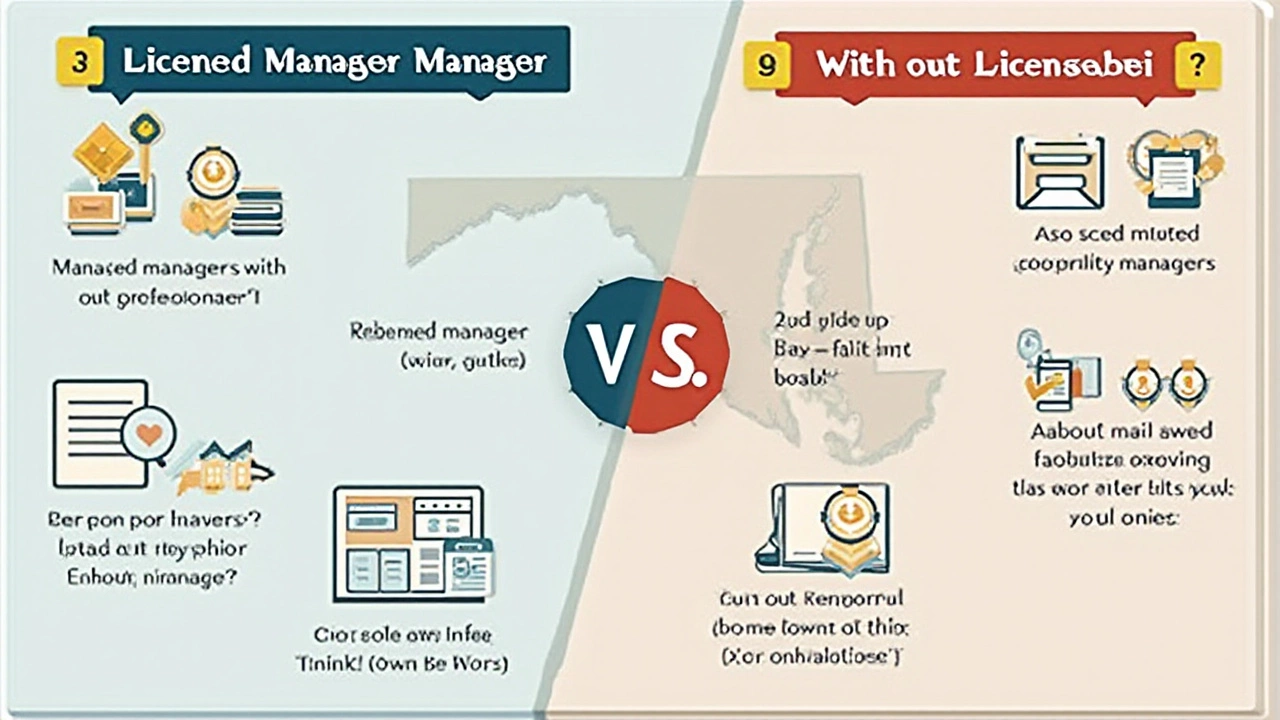Licensing Requirements for Property Managers in Maryland

In the world of property management, understanding the legal framework within which you operate is crucial, especially when it comes to licensing requirements. Maryland presents a unique set of rules that determine whether or not a property manager needs to hold a license. This varies based on specific job responsibilities and the nature of the work involved.
This article aims to unravel these intricacies and provide clarity for those navigating or considering a career in Maryland's property management sector. Whether you're an aspiring property manager or an experienced professional seeking to broaden your understanding, knowing if you're required to hold a real estate license could impact your work significantly.
We will explore what defines property management in Maryland, go through the licensing requirements, and outline scenarios where a license is not necessary. Learn about the consequences that could arise from operating without a proper license and gain valuable tips on obtaining one to enhance your professional credibility in this field.
- Understanding Property Management in Maryland
- Licensing Requirements in Maryland
- Exemptions from Licensing
- The Role of a Licensed Property Manager
- Consequences of Operating Without a License
- Tips for Becoming a Licensed Property Manager
Understanding Property Management in Maryland
When we delve into the realm of property management in Maryland, it's crucial to recognize the state’s unique legal landscape that governs this sector. The role of a property manager can vary significantly, covering everything from maintaining the aesthetic and functional aspects of a building to ensuring tenant compliance with lease agreements. This can expand toward financial duties such as collecting rents, paying property bills, and preparing financial reports. Property management in Maryland is not merely about maintaining properties, but also about managing tenant relationships and ensuring legal compliance with the various state and local housing regulations.
In Maryland, the specifics of property management are guided by stringent regulations, much of which revolves around whether or not engaging in certain management tasks requires a real estate license. This distinction is particularly crucial for those involved in managing residential versus commercial properties. Residential property managers often need to ensure tenants adhere to lease agreements, oversee property maintenance, and mediate conflicts, while commercial property managers might focus more on building operations and lease negotiations.
To highlight the complexity of property management in Maryland, consider the fact that all real estate transactions are subject to certain statutes that require managers to operate under licensed real estate brokers, if they are actively involved in soliciting tenants or negotiating leases. This means that without proper licensing, a property manager could inadvertently violate state laws, leading to penalization or fines. Highlighting these nuances can prevent future misunderstandings and guide prospective managers in aligning themselves with Maryland’s specific rules.
"In Maryland, the line between a good property manager and a great one often hinges on their understanding of the legal landscape, particularly the nuanced requirements for licensing." - John Peters, Real Estate Expert.
Maryland's property management sector has seen fluctuations influenced by both market conditions and legislative changes. Data from recent years indicates an increase in the demand for rental properties, subsequently fueling the need for knowledgeable managers who can navigate administrative tasks efficiently while maintaining legal compliance. With the challenges this market presents, property managers must be well-versed in areas such as tenant rights, property law, and state-specific regulations to be effective in their roles.
As we conclude our examination, understanding the core components of property management in Maryland involves acknowledging the ever-evolving expectations from both property owners and tenants. The demand for an efficient management approach continues to rise, emphasizing the importance of being informed about the necessary qualifications and evolving responsibilities within this field. Keeping abreast of changes in state legislation and remaining vigilant about legal compliance can significantly benefit anyone aspiring to succeed in property management in Maryland's competitive market.
Licensing Requirements in Maryland
Maryland sets forth specific stipulations when it comes to property management and the necessity of acquiring a license. If you plan to manage properties in this state, it's essential to recognize when you must possess a real estate license and when you may be exempted from this requirement. The primary determining factor tends to center around the tasks performed by the property manager. Generally, if you handle rental listings, negotiate leases, or collect rents, a real estate license is often required. However, acting as a pure administrative assistant without engaging in these activities might not necessitate licensing. Schools offering real estate courses are abundant, which helps individuals gain the education required to navigate this landscape.
According to the Maryland Department of Labor, Licensing, and Regulation, a real estate license is vital for performing duties associated traditionally with a licensed real estate broker or sales agent. Such duties include negotiating leases or rents on behalf of property owners or collecting rental payments directly. Those who conduct property showings, lease negotiations, or handle trust accounts must also adhere to licensing rules. A noteworthy consideration is the need for property managers to affiliate with a licensed real estate broker and ensure all transactions align with Maryland's real estate laws. In some cases, unique arrangements allow property managers to operate with fewer restrictions, but these are exceptions rather than the norm.
"The key to successful property management in Maryland is abiding by the same principles of honesty, integrity, and diligence that underpin all real estate transactions."— John Doe, a seasoned real estate professional.
Exemptions from licensing requirements exist but apply narrowly. Typically, on-site residential managers, employed directly by property owners and not engaging in broader real estate activities, may operate without a real estate license as long as they conduct their duties within the bounds of their employment agreement. This setup shields them from legal entanglements that unlicensed activity might attract. Another form of exemption concerns corporations or partnerships where the sole duty of a manager is to oversee the specific properties owned by the entity. It is always advisable to reference the current regulations since these stipulations can evolve, impacting the legality of a property manager's actions.
A prospective property manager in Maryland would benefit from following clear steps to ensure compliance. The first step involves reviewing the Maryland real estate statutes to ascertain whether one's specific duties fall under the licensing requirements. Following this, engaging in an educational program through a state-approved real estate school prepares candidates for the licensing examination. Finally, passing the licensing exam and affiliating with a licensed brokerage forms the last step of aligning one's professional practice with legal standards. To streamline processes, many resources, including online courses, can support aspiring property managers in achieving licensure efficiently.
An understanding of the broader economic conditions can also aid property managers in structuring their services competitively. As of 2024, Maryland has experienced moderate growth in the real estate sector, sparking increased demand for qualified property management professionals. A proactive approach in satisfying all licensing prerequisites can open doors to a rewarding career, while also ensuring legal integrity and compliance.

Exemptions from Licensing
While many aspiring property managers in Maryland may wonder if they need to obtain a real estate license to operate legally, there are specific scenarios where exemptions come into play. In Maryland, the intricacies of property management legislation are such that not every manager is obliged to procure a license, particularly when certain conditions are met. Understanding these exemptions can save both time and resources for individuals who manage properties within the state's jurisdiction.
Primarily, those who manage properties that they own outright are typically exempt from requiring a licensing. Ownership confers a direct interest in the management outcomes, which assumes a degree of implicit regulation over how a property is managed. This provision is crucial for small-scale landlords or those managing their investments personally. If you're leasing family-owned properties or simply handling maintenance and tenant issues for relatives without professional compensation, licensing isn't necessary either.
Employees of licensed real estate brokers are another group that may not need to be individually licensed. When such staff operate under the oversight of a licensed broker, their activities are covered by the broker's license. This saves licensed firms from the cumbersome necessity for all their staff to pursue independent licenses, provided these team members adhere strictly to their assigned duties as predicated by the broker. A statement from an official at a regional real estate board once highlighted:
"Working under a licensed broker provides a level of accountability and structure that substitutes the need for individual licensing in many cases."
Additionally, there are often exemptions for those whose roles fall outside the traditional scope of leasing or handling property transactions. For instance, maintenance workers, accountants, and clerical staff who assist in property management tasks but do not engage in leasing or buying activities typically do not need licensing. This distinction is essential in maintaining clarity for property staff and ensuring that resources are directed towards roles more directly involved in state-regulated activities.
It's worth noting, however, that the mere absence of a licensing requirement does not exempt individuals from understanding Maryland's real estate laws and tenant regulations. Being well-versed in local landlord-tenant laws is advisable, even in situations where licensing is not mandatory. The ethical and legal management of property assets goes beyond the mere possession of a license and speaks to the competence and professionalism with which tasks are handled.
The Role of a Licensed Property Manager
Being a licensed property manager in Maryland means navigating a complex landscape of responsibilities that extend beyond what might be apparent on the surface. A crucial part of this role involves managing both residential and commercial properties, ensuring they are well-maintained and compliant with local regulations. Licensed property managers handle everything from tenant screening to arranging repairs, and they are expected to balance the interests of property owners with the needs of renters. This complex juggling act requires a deep understanding of legal obligations, tenant rights, and property laws specific to Maryland.
One of the key responsibilities includes the management of rental agreements and leases. This involves drafting and enforcing leases that comply with Maryland's legal standards. A licensed property manager must have the competency to negotiate and implement lease terms that are fair and beneficial for both the landlord and tenant. Effective communication and negotiation skills are pivotal here because a manager’s effectiveness directly influences tenant satisfaction and occupancy rates.
Financial Oversight and Reporting
Additionally, financial management forms a significant part of their duties. Managing property finances involves setting budgets for each property, collecting rent, handling operating expenses, and ensuring timely payments. Property managers prepare detailed financial reports to provide property owners with insights into their income and expenses. This aspect of the job requires sharp accounting skills and a keen eye for detail. As reported by the Institute for Real Estate Management, licensed managers who excel in financial oversight tend to experience better client retention rates, which speaks volumes about the trust clients place in accurate financial reporting.
"Property management requires a balance of financial acumen and interpersonal skills, something that a license ensures through standardized education and ethical training." - Real Estate Research Institute
Handling Legal Matters Effectively
Legal expertise is another cornerstone of a successful property management career. Licensed managers are often tasked with addressing complaints, handling evictions, and managing property maintenance issues. Ensuring that these tasks comply with Maryland's stringent property laws helps avoid legal pitfalls. A significant advantage of holding a real estate license is access to ongoing education, which keeps managers abreast of changes in property legislation. This is essential because even minor oversights in legal compliance can lead to significant disputes or financial penalties. For instance, in 2023, a record number of lease dispute cases in Maryland hinged on issues that licensed managers had to resolve, showcasing their crucial role in legal mediation.
Strategic Marketing and Tenant Relations
Moreover, a licensed property manager in Maryland often steps into the role of a marketer. They are responsible for promoting vacant properties and attracting potential renters through targeted marketing strategies. They need to showcase properties effectively, often using digital platforms to reach a broader audience. In doing so, they enhance the asset's visibility, indirectly boosting its value. New marketing technologies, like virtual tours, have become indispensable tools in their arsenal, appealing to tech-savvy tenants and aiding rapid tenant onboarding. Finally, retention strategy stands out as an art within property management. A successful property manager excels at fostering a community-like environment where tenants feel valued and heard. This involves regular communication and the implementation of tenant feedback to improve services. By cultivating good tenant relations, managers help decrease turnover rates, ensuring properties remain occupied. Given the competitive real estate market in Maryland, these skills help licensed property managers stand out, ultimately enhancing their reputation and increasing demand for their expertise.

Consequences of Operating Without a License
Walking the tightrope of managing properties without a valid license in Maryland carries risk, one that is often underestimated yet significant. For property managers, operating sans proper credentials not only jeopardizes their current business operations but can also tarnish their professional reputation long-term. The state of Maryland mandates a real estate license for individuals engaging in certain critical property management tasks. These tasks might include negotiating leases or managing rental listings, hinting at the legal grey area that can trap unlicensed managers.
Failing to comply with these laws could lead to severe penalties. The fines imposed can range quite significantly, sometimes stretching into thousands of dollars. Moreover, the legal repercussions do not end there. A court may also issue a cease-and-desist order, effectively halting all business operations until compliance is achieved. Such disruptions can cause considerable financial strain and even lead to losing clients who demand adherence to legal standards. Beyond financial costs, the damage to one's reputation must be considered—a damaged reputation might last long after the fines are paid.
Another compelling reason to secure proper licensing is credibility. In a domain where trust is key, having a license serves as verifiable proof of expertise and legitimacy. Property owners and tenants alike often prefer to work with managers who demonstrate acknowledged industry standards. An unlicensed manager might struggle to earn this trust, potentially forcing them to rely on short-term clients or less desirable properties.
According to Jennifer Pugh, a noted expert in property management law, "The moment an unlicensed manager is reported, the impact can be profound and immediate, affecting not just the individual but potentially their associated businesses."
Moreover, insurance implications are a critical concern. Operating without a license might void professional liability insurance, leaving a property manager vulnerable to lawsuits without the safety net of insurance support. On top of financial liabilities stemming from such exposures, this could discourage clients who place insurance coverage high on their list of working requirements. Therefore, property management without proper licensing in Maryland is fraught with challenges that outweigh any perceived benefits.
Staying informed about the specific tasks that require licensing under Maryland law is crucial. Property managers should always ensure that their activities fall within any legal exemptions or that they secure the necessary credentials. This not only protects them legally but also propels them into a respected position within a competitive market.
Tips for Becoming a Licensed Property Manager
Embarking on the journey to becoming a licensed property manager in Maryland is an adventure that can open up a world of opportunities. The industry here offers various roles, responsibilities, and rewards, but your first step should be gaining the appropriate credentials. Knowing the process can ease your transition and lead to a successful career in real estate. Let's dive deep into the practical ways to obtain your license and set yourself apart from the competition in this thriving sector.
First and foremost, understanding the specific licensing requirements in Maryland is crucial. The state mandates that property managers primarily involved in leasing, renting, or negotiating leases on behalf of property owners must hold a real estate license. Non-compliance can lead to significant penalties, so it's important to start by reviewing the Maryland Real Estate Commission's guidelines. You should allocate ample time to thoroughly study these regulations, ensuring that you meet all necessary prerequisites, such as age and education. It's essential for aspiring property managers to have completed a high school diploma or equivalent before proceeding, as this forms the foundation of eligibility.
Once you confirm that you meet the eligibility criteria, the next step is to seek out educational programs that satisfy the state's requirements. You can find courses approved by the Maryland Real Estate Commission, which typically offer a comprehensive curriculum covering real estate principles and practices. These courses are designed to arm you with the knowledge needed for the state's licensing examination. Look for programs that provide flexible learning options, such as online classes or weekend courses, as they cater to diverse schedules. Investing your time in a reputable program can significantly increase your chances of passing the exam on your first attempt.
Another crucial step is preparing for and passing the licensing exam. The exam covers various topics, including property management fundamentals, ethical considerations, and state laws. Successful applicants often describe the value of using multiple study methods, such as flashcards, practice tests, and study groups. These tools can enhance your understanding and retention of key concepts. It’s also helpful to create a structured study plan that allocates daily time slots for dedicated learning. This routine will not only keep you organized but also reduce the stress associated with exam preparation.
Gaining Experience and Building a Network
Once you've passed the exam, gaining firsthand experience and building a network can kickstart your career as a licensed property manager. Look for internship opportunities or entry-level positions in property management companies. These roles offer invaluable insights into daily operations, tenant interactions, and property maintenance. Engaging actively in these experiences can build your confidence and competence in real-world scenarios, laying a solid foundation for your professional journey.
Networking is equally important in the field of property management. Attend real estate conferences, local meetups, and workshops to connect with seasoned professionals. These interactions can provide mentorship opportunities, long-lasting relationships, and potential job offers. Industry associations often offer workshops and seminars, which are fantastic platforms for you to learn from thought leaders and establish your presence within the community.
Maryland real estate is a vibrant and growing sector, with many opportunities for licensed property managers who are prepared to navigate its complexities. By carefully following these steps, committing to continuous learning, and nurturing professional relationships, you can build a successful career in property management with both confidence and proficiency.






Write a comment